She Was Like a Wild Chrysanthemum is a japonais film of genre Drama directed by Keisuke Kinoshita with Chishū Ryū
She Was Like a Wild Chrysanthemum (1955)
Nogiku no gotoki kimi nariki
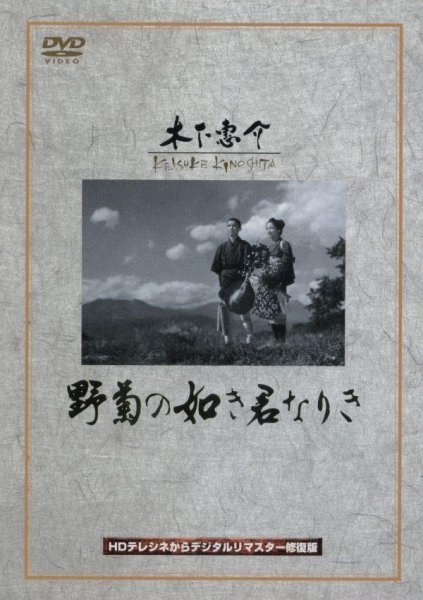
If you like this film, let us know!
- Infos
- Casting
- Technical infos
- Photos
- Videos
- Film quotes
- Characters
- Music
- Awards
She Was Like a Wild Chrysanthemum (野菊の如き君なりき Nogiku no gotoki kimi nariki), also known as You Were Like a Wild Chrysanthemum or My First Love Affair, is a Japanese film directed by Keisuke Kinoshita which was initially released in 1955. It is based on a novel by Saicho Ito. The film is set in the Meiji period. The story tells of the forbidden romance between teenaged cousins Masao and Tamiko. The lovers were also inhibited by a marriage arranged by her family for Tamiko and Masao needing to go away to school. The story is essentially a flashback as remembered by the 73-year-old Masao, played by Chishū Ryū, as he rides a boat back to his home village where they first fell in love. The flashback scenes are filmed using and oval-shaped mask typically associated with silent films. According to Alexander Jacoby, this masking gives the film "an appropriately nostalgic tone." Film critic Donald Richie describes the film style as representing "Meiji daguerrotypes."
Jacoby rates She Was Like a Wild Chrysanthemum to be "among the most purely moving of Japanese films," despite its "occasional naivety." He attributes this particularly to Kinoshota's "simple techniques," including "judicious choice of camera position," and to the excellent performances. Richie regards the film as one of Kinoshita's "most successful" in his later style. Joseph L. Anderson praises the film's photography, particularly the "rich blacks" and Kinoshita's "evocation of [the] area." Jacek Kloiowski, et al., regard the film as "one of the most sincere and purest films of its type in Japanese cinema," noting that it marks a return to "pastoral lyricism" for Kinoshota after focusing his films on social issues for the previous few years.
Cinematographer Hiroshi Kusuda won the Mainichi Film Award for cinematography in 1956 for his work on She Was Like a Wild Chrysanthemum and another Kinoshita–directed film, The Tattered Wings. He also won the Blue Ribbon Award for cinematography for the same two films.
Synopsis
Masao, un homme âgé retourne dans son village natal après l'avoir quitté pendant près de soixante ans. Tandis qu'il redécouvre les endroits qu'il a fréquenté durant son enfance, il se remémore sa jeunesse, son amour pour sa cousine Tamiko promise à un mariage arrangé et son départ du village afin de pouvoir étudier.Actors
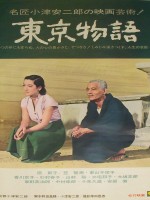
Chishū Ryū
(Masao - Age 73)
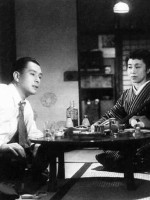
Haruko Sugimura
(Masao's mother)

Takahiro Tamura

Toshio Kobayashi
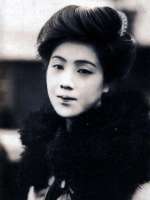
Kumeko Urabe
(Grandmother)
Comments
Leave comment :
Suggestions of similar film to She Was Like a Wild Chrysanthemum
There are 87 films with the same actors, 14 films with the same director, 68162 with the same cinematographic genres (including 13412 with exactly the same 2 genres than She Was Like a Wild Chrysanthemum), 6889 films with the same themes (including 3827 films with the same 2 themes than She Was Like a Wild Chrysanthemum), to have finally 70 suggestions of similar films.If you liked She Was Like a Wild Chrysanthemum, you will probably like those similar films :

Army (1944)
, 1h27Directed by Keisuke Kinoshita
Origin Japon
Genres Drama, War
Themes Seafaring films, Politique, Transport films, Political films
Actors Chishū Ryū, Kinuyo Tanaka, Ken Mitsuda, Haruko Sugimura, Shin Saburi, Eijirō Tōno
Rating64%





Chronique sur trois générations d'une famille de commerçants de Kyūshū, fidèles à l'Empereur et ardents patriotes, et ses relations avec l'armée depuis l'Ère Meiji jusqu'à l'invasion de la Mandchourie.
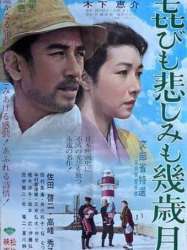
Times of Joy and Sorrow (1957)
, 2h42Directed by Keisuke Kinoshita
Genres Drama
Themes Seafaring films, Transport films
Actors Hideko Takamine, Keiji Sada, Takahiro Tamura, Katsuo Nakamura, Yōko Katsuragi, Kuniko Igawa
Rating70%





L'histoire des tribulations d'un gardien de phare et de sa femme.

The Ballad of Narayama (1958)
, 1h38Directed by Keisuke Kinoshita
Origin Japon
Genres Drama
Themes Seafaring films, Sports films, Transport films, Vieillesse, Martial arts films
Actors Kinuyo Tanaka, Yūko Mochizuki, Teiji Takahashi, Seiji Miyaguchi, Yūnosuke Itō, Ken Mitsuda
Rating77%





Un village de haute montagne, au Japon : selon une coutume ancestrale, et, à cause du manque de nourriture, les hommes et les femmes de plus de 70 ans doivent être transportés sur le dos, par un des leurs, et abandonnés au mont Narayama. La vieille Orin, en âge d'y être conduite, encourage son fils, Tatsuhei, à accomplir cette tâche. La mère est déterminée mais le fils agit contre sa propre volonté.

Tokyo Twilight (1957)
, 2h20Directed by Yasujirō Ozu
Origin Japon
Genres Drama
Themes Films about families, Pregnancy films, Seafaring films, Transport films
Actors Kamatari Fujiwara, Ineko Arima, Setsuko Hara, Isuzu Yamada, Chishū Ryū, Haruko Sugimura
Rating80%





Akiko Sugiyama (Ineko Arima) is a young college graduate girl learning English shorthand. Her elder sister Takako (Setsuko Hara), running away from an unhappy marriage, has returned home to stay with Akiko and their father Shukichi (Chishū Ryū) in Tokyo, together with her toddler girl. Shukichi works in a bank in Tokyo. Akiko has a relationship with her college boyfriend Kenji, which results in an unwanted pregnancy. Later, Akiko has an abortion after an encounter in which she realizes that her boyfriend does not love her.
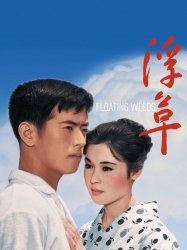
Floating Weeds (1959)
, 1h59Directed by Yasujirō Ozu
Origin Japon
Genres Drama
Themes Seafaring films, Films about television, Transport films
Actors Ganjirō Nakamura, Machiko Kyō, Ayako Wakao, Hiroshi Kawaguchi, Chishū Ryū, Haruko Sugimura
Rating78%





The film takes place during a hot summer in 1958 at a seaside town on the Inland Sea. A troupe of travelling theatre arrives by ship, headed by the troupe's lead actor and owner, Komajuro (Ganjiro Nakamura). The rest of the troupe goes around the town to publicise their kabuki performances.

Tokyo Story (1953)
, 2h16Directed by Yasujirō Ozu
Origin Japon
Genres Drama
Themes Films about families, Seafaring films, Transport films
Actors Chishū Ryū, Setsuko Hara, Chieko Higashiyama, Haruko Sugimura, Sō Yamamura, Kyōko Kagawa
Rating81%





A retired couple, Shūkichi and Tomi Hirayama (played by Chishū Ryū and Chieko Higashiyama respectively) live in the town of Onomichi in southwest Japan with their unmarried youngest daughter Kyōko (played by Kyōko Kagawa). They have a total of 5 children, who are all grown up. The couple travel to Tokyo to visit their son and daughter as well as their widowed daughter-in-law.

Late Chrysanthemums (1954)
, 1h41Directed by Mikio Naruse
Origin Japon
Genres Drama
Themes Seafaring films, Transport films
Actors Haruko Sugimura, Yūko Mochizuki, Sadako Sawamura, Ken Uehara, Chikako Hosokawa, Daisuke Katō
Rating73%





Kin, the first of the geisha, is consumed by the idea of wealth. As a moneylender, she is an embittered businesswoman who is insistent upon being repaid by her former geisha sisters, Tamae and Tomi. She is the love interest of a former soldier in Manchuria, Seki, who was sent to jail after trying to commit suicide with her many years ago. He returns to try to borrow money from her, but is quickly turned away. In the end, he is sent back to jail for a money-related crime. Kin then becomes excited when she hears that Tabe, her former patron and lover, is returning. However, she becomes furious after realizing that he does not love her, but rather just wants to borrow her money as well. She kicks him out and burns his photograph to erase his memory. In the end, she leaves the city on a search for property to buy.

Twenty-Four Eyes (1954)
, 2h30Directed by Keisuke Kinoshita
Origin Japon
Genres Drama, Historical
Themes Films about education
Actors Hideko Takamine, Chishū Ryū, Yumeji Tsukioka, Takahiro Tamura, Shizue Natsukawa, Kuniko Igawa
Rating79%





The movie follows the career of a schoolteacher named Hisako Ōishi (played by Hideko Takamine) in Shōdoshima during the rise and fall of Japanese ultra-nationalism in the beginning of the Shōwa period. The narrative begins in 1928 with the teacher's first class of first grade students and follows her through 1946.

Early Summer (1951)
, 2h4Directed by Yasujirō Ozu
Origin Japon
Genres Drama, Comedy-drama
Themes Seafaring films, Transport films
Actors Setsuko Hara, Chishū Ryū, Chikage Awashima, Ichirō Sugai (菅井一郎), Kuniko Miyake, Haruko Sugimura
Rating80%





Noriko (Setsuko Hara), a secretary in Tokyo, lives in the extended Mamiya family at Kamakura, Kanagawa, which includes her parents Shūkichi and Shige (Ichirō Sugai and Chieko Higashiyama), her older brother Kōichi (Chishū Ryū), a physician, his wife Fumiko (Kuniko Miyake), and their two young sons Minoru (Zen Murase) and Isamu (Isao Shirosawa).

Tora-san's Grand Scheme (1970)
, 1h32Origin Japon
Genres Comedy, Comedy-drama, Romance
Themes Seafaring films, Transport films
Actors Kiyoshi Atsumi, Chieko Baishō, Komaki Kurihara, Tadashi Yokouchi, Chishū Ryū, Sachiko Murase
Rating68%





Hoping to repay his family for the trouble he has caused them in the past, Torasan gambles and wins at the horse races. He plans to give his uncle and aunt a vacation in Hawaii, but the travel agent turns out to be a con-artist, and makes off with his money. Torasan falls in love with Haruko, a young kindergarten teacher who is renting a room in his uncle's home.
 Connection
Connection